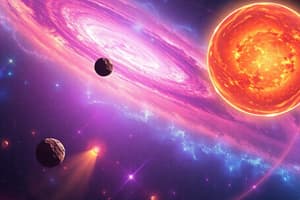Podcast
Questions and Answers
Which of the following is NOT a type of galaxy?
Which of the following is NOT a type of galaxy?
- Elliptical galaxy
- Irregular galaxy
- Neutron galaxy (correct)
- Spiral galaxy
What is the primary function of a propulsion system in space travel?
What is the primary function of a propulsion system in space travel?
- To communicate with Earth
- To generate power for the spacecraft
- To propel the spacecraft through space (correct)
- To support life for the astronauts
What is the term for the study of the origin and evolution of the universe?
What is the term for the study of the origin and evolution of the universe?
- Galactic astronomy
- Cosmology (correct)
- Stellar astronomy
- Planetary science
What is the term for a galaxy that is actively emitting massive amounts of energy?
What is the term for a galaxy that is actively emitting massive amounts of energy?
What is the primary concern for astronauts in space?
What is the primary concern for astronauts in space?
What is the term for the study of celestial objects and phenomena?
What is the term for the study of celestial objects and phenomena?
What is the term for a space mission that does not carry humans?
What is the term for a space mission that does not carry humans?
What is the term for the study of planets, moons, and asteroids?
What is the term for the study of planets, moons, and asteroids?
Flashcards are hidden until you start studying
Study Notes
Astronomy
- Study of the physical nature of celestial objects and phenomena
- Branches:
- Planetary science: study of planets, moons, and asteroids
- Stellar astronomy: study of stars and their life cycles
- Galactic astronomy: study of galaxies and galaxy evolution
- Cosmology: study of the origin and evolution of the universe
Galaxies
- Massive, gravitationally bound systems consisting of:
- Stars
- Stellar remnants
- Interstellar gas and dust
- Dark matter
- Types:
- Spiral galaxies (e.g., Milky Way)
- Elliptical galaxies
- Irregular galaxies
- Active galaxies (e.g., quasars)
Space Travel
- Exploration of space beyond Earth's atmosphere
- Types:
- Crewed spaceflight: human space travel
- Uncrewed spaceflight: robotic spacecraft
- Methods:
- Launch vehicles: rockets that carry spacecraft into orbit
- Propulsion systems: engines that propel spacecraft through space
- Life support systems: systems that sustain human life in space
- Challenges:
- Radiation exposure
- Microgravity effects on human health
- Distance and communication delays
- Extreme temperatures and environments
Space Exploration Timeline
- 1950s: Launch of Sputnik 1 (USSR) and Explorer 1 (USA)
- 1960s: First human spaceflight (Yuri Gagarin, USSR) and moon landing (Apollo 11, USA)
- 1970s: Launch of Voyager 1 and 2 (USA)
- 1980s: Launch of the Hubble Space Telescope (USA)
- 1990s: Launch of the International Space Station (USA, Russia, Japan, Europe, Canada)
- 2000s: Launch of the Mars Exploration Rovers (USA) and New Horizons (USA)
- 2010s: Launch of the Curiosity Rover (USA) and Voyager 1 enters interstellar space
Astronomy
- Study of celestial objects and phenomena, including their physical nature
- Divided into four main branches:
- Planetary science: planets, moons, and asteroids
- Stellar astronomy: stars and their life cycles
- Galactic astronomy: galaxies and galaxy evolution
- Cosmology: origin and evolution of the universe
Galaxies
- Massive, gravitationally bound systems consisting of:
- Stars, stellar remnants, interstellar gas and dust, dark matter
- Types of galaxies:
- Spiral galaxies (e.g., Milky Way)
- Elliptical galaxies
- Irregular galaxies
- Active galaxies (e.g., quasars)
Space Travel
- Exploration of space beyond Earth's atmosphere
- Types of space travel:
- Crewed spaceflight: human space travel
- Uncrewed spaceflight: robotic spacecraft
- Methods of space travel:
- Launch vehicles: rockets that carry spacecraft into orbit
- Propulsion systems: engines that propel spacecraft through space
- Life support systems: systems that sustain human life in space
- Challenges of space travel:
- Radiation exposure
- Microgravity effects on human health
- Distance and communication delays
- Extreme temperatures and environments
Space Exploration Timeline
- 1950s:
- Launch of Sputnik 1 (USSR)
- Launch of Explorer 1 (USA)
- 1960s:
- First human spaceflight (Yuri Gagarin, USSR)
- First moon landing (Apollo 11, USA)
- 1970s:
- Launch of Voyager 1 and 2 (USA)
- 1980s:
- Launch of the Hubble Space Telescope (USA)
- 1990s:
- Launch of the International Space Station (USA, Russia, Japan, Europe, Canada)
- 2000s:
- Launch of the Mars Exploration Rovers (USA)
- Launch of New Horizons (USA)
- 2010s:
- Launch of the Curiosity Rover (USA)
- Voyager 1 enters interstellar space
Studying That Suits You
Use AI to generate personalized quizzes and flashcards to suit your learning preferences.




